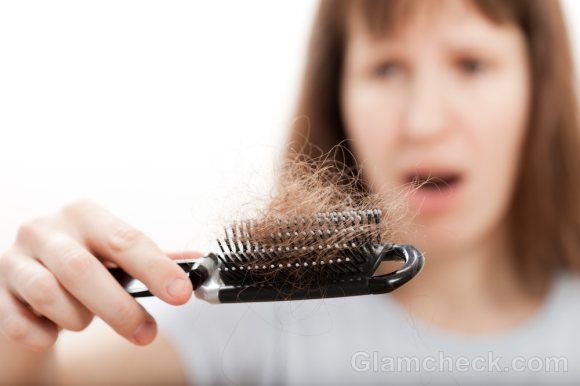 Telogen effluvium is a hair loss condition that affects men and women equally. It can happen at any time in life from infancy to old age. When telogen effluvium occurs, hair suddenly starts to shed in large quantities and the hair thins out considerably. Telogem effluvium can occur all over the body. But it is only really noticeable on the scalp.
Telogen effluvium is a hair loss condition that affects men and women equally. It can happen at any time in life from infancy to old age. When telogen effluvium occurs, hair suddenly starts to shed in large quantities and the hair thins out considerably. Telogem effluvium can occur all over the body. But it is only really noticeable on the scalp.
To understand telogem effluvium, it is important to know a little more about the stages of hair growth. There are three stages of hair growth – anagen, catagen, and telogen. Every hair on your scalp and body goes through all three phases.
Anagen is the growth phase where the hair grows from the follicle for 2 to 3 years. Catagen is a transition phase that indicates the end of the growth phase, and the hair prepares to enter the next stage – telogen. Telogen is the resting phase of hair growth that last for about 3 months. No more growth occurs during this stage. The hair is simply resting in the follicle until a new hair begins to grow and pushes out the old one. Between 5 to 15% of all the hair on your head at any given point is in the telogen stage.
When the body is under great stress, it can cause a considerable number of hairs to spontaneously go into the telogen phase at the same time. This means that when the new hair begins to grow, the hairs in the telogen phase will rapidly start to fall out and the hair on the scalp will appear thinner for a while. Sometimes, the hair in the telogen phase can fall out even before a new hair pushes it out, which can lead to drastic thinning and make it seem close to balding. However, blading from telogen effluvium is rare.
Types of Telogen Effluvium
 Acute telogen effluvium is when the hair sheds consistently for anywhere between 1 to 6 months. Hair fall starts suddenly. Usually, the cause of acute telogen effluvium is obvious and can easily be identified. Patients may relate a change in diet, medication, or a time of illness or stress about 3 months before the hair loss occurred, which can explain the onset of acute telogen effluvium.
Acute telogen effluvium is when the hair sheds consistently for anywhere between 1 to 6 months. Hair fall starts suddenly. Usually, the cause of acute telogen effluvium is obvious and can easily be identified. Patients may relate a change in diet, medication, or a time of illness or stress about 3 months before the hair loss occurred, which can explain the onset of acute telogen effluvium.
Chronic telogen effluvium patients will suffer from hair loss for more than 6 months, sometimes as much as several years. Hair loss is usually gradual, and it is much more difficult to pin down the causes of this form of telogen effluvium since the hair loss has been happening for so long and so slowly that it is difficult to determine when exactly is started and therefore associate a particular event with it. The hair that does exist on the scalp is thin and lifeless and has no bounce or shine.
Causes of Telogen Effluvium
As mentioned briefly before, telogen effluvium occurs when the body is under great stress. Following are some of the stressful instances which can cause the body to react in the form of telogen effluvium
- An erratic metabolism due to hormonal problems or bad eating habits can cause telogen effluvium.
- Change your diet drastically – as would be the case with crash dieting – and you may find yourself with a case of telogen effluvium.
- People who have eating disorders like anorexia nervosa or bulimia will frequently suffer from telogen effluvium.
- Any long-term illness can bring on telogen effluvium. Some people even suffer from telogen effluvium after a particularly nasty bout of the flu.
- Major surgeries are very stressful on the body. In the weeks after surgery during which the body is recovering, many of the hairs on the head can go into the telogen phase and will fall out in a few more weeks.
- Pregnancy and childbirth are known to cause hair loss problems. Many women find that they lose their hair because of telogen effluvium a few months after their babies are born.
- A dysfunctional thyroid can also lead to telogen effluvium.
- Anemics are also at risk of developing telogen effluvium if their hemoglobin levels are low for prolonged periods.
- Certain medications have been known to make the hair go into the telogen phase. Speak to your doctor whenever you are prescribed with a new medication and ask if telogen effluvium is one of the known side effects.
- Even immunization shots can have telogen effluvium as one of the side effects. Again, check with your doctor.
- It is not uncommon for stress and psychological trauma to cause telogen effluvium.
- Some women will experience a spell of telogen effluvium when they get off long-term use of the contraceptive pill.
- Exposing your hair to the sun for prolonged periods, especially if you live in a tropical climate and get out in the hottest hours of the day, can also lead to telogen effluvium.
Treatment for Telogen Effluvium
Usually though, telogen effluvium resolves itself within about 6 months without any treatment. It can, however, be very traumatic and embarrassing to live with the problem for so long, which is why most sufferers seek help.
Telogen effluvium treatment will highly depend on the cause of this hair loss condition. If you know why you are suffering from telogen effluvium – especially if it is an illness or an eating disorder – then you can actively participate in healing your body so as to prevent further hairs from going into the telogen stage of hair growth. If you are ill or stressed out, then your first priority should be to heal your body or reduce your stress, without which you cannot hope to fix your hair problems. Note that there is no real ‘cure’ for telogen effluvium, and the condition does not respond at all to medication or outside help. So whether you like it or not, the power to fix this problem lies in your body, and thus in your hands alone.
Even a hair expert will suggest that you just wait it out. Telogen effluvium does not lead to baldness, so that is not something you have to worry about. While you wait for your hair to grow back, you can learn to wear it in styles that mask the lack of density. Also remember to treat your hair gently – avoid brushing or combing too hard, use natural hair products, cut down on or eliminate visits to salons or spas. Another thing that could help is having a more nutritious diet.
Image: Shutterstock
